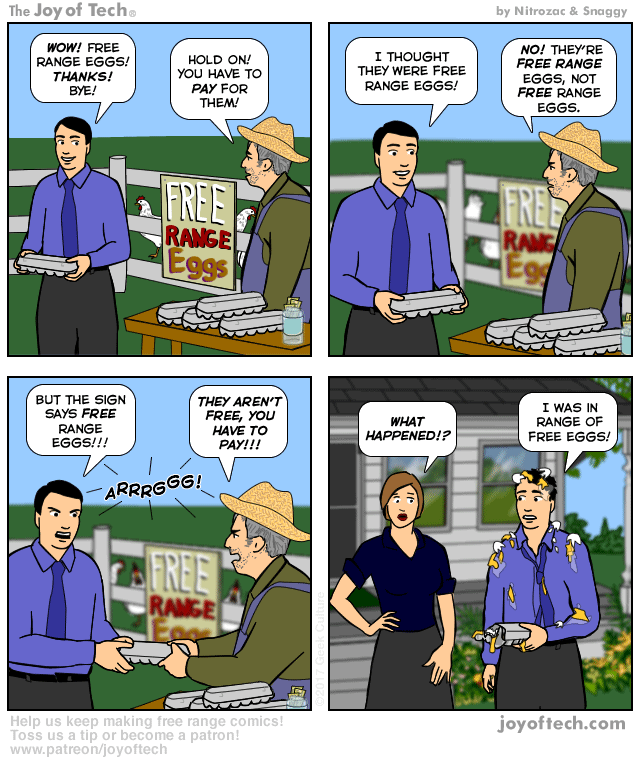Good Old Like and As
“Like” and “as” are easy to get mixed up. It doesn’t help a lot to say that “as” is an adverb and “like” is a preposition. Too complicated. You might find it easier to remember, perhaps, that “as” goes with verbs, and “like” goes with nouns and pronouns.
Here’s a guy who sounds right both times, uses two different constructions, and we understand him, but he’s wrong! Take a look at the second panel in the Dec 9, 2017 edition of Mr. Fitz:

“Think like I do” sounds right. That’s because you have the verb “do,” that goes with “I.” But technically, it should be “think as I do.” By the way, it’s a good idea to include that “do” in this sort of construction; doing so removes ambiguity.
Then he hauls off and says, “think like me.” And that also sounds correct! It sounds correct because “like” feels like a preposition with that “me” all by itself after it. Well, “like” is a preposition. But he’s modifying a verb (think) with an adjective phrase. That’s a no-no. Take the book title “Black Like Me.” The color, black, an adjective, goes with the pronoun “me.” That’s correct. If he had said “a thinker like me,” since “thinker” is a noun, he would be correct, at least grammatically.
Heavy-duty grammar lesson today. Sorry.
Subscribe to this blog's RSS feed
A good Explanation of Why Hyphens are Important
I’ve mentioned the Oxford comma several times over the years. I’ve mentioned hyphens and dashes now and then, too, even compounding of adjectives. Well, here’s some of that again: compound adjectives.
Here’s the rule: If two (or more) adjectives together modify a word, hyphenate them. (If the first word happens to be an adverb, the hyphen can be optional, especially if it’s a common phrase.)
Okay, here’s a compound adjective done wrong:
Since “hand job” is a real thing, apparently (something salacious, I guess), the paper has pretty well embarrassed itself, because they meant “first-hand,” which is also a real thing. The error occurs inside the article, too, as “first hand experience.”
No wonder newspapers are on the decline: They are getting rid of their copy editors!
PS—Today I ran into a headline from someone who did it right:
Newberry Cabin, mammoth fossil provide science students hands-on learning opportunities
Also from a newspaper, by the way, the Star-Telegram. (Their name is a compound noun, not a compound adjective.)
Poor Old Adverbs—They are so Misused
First, I see now that we’re using adjectives as verbs! “Harsh,” an adjective, is now in style as a verb: “Don’t harsh my, um whatever.” I suppose “criticize” has become too long a word for some folks to use. Harrumpf.
But now that I mentioned verbs and adjectives, that leads to adverbs, another word that adjectives frequently replace. Here’s a Pickles to illustrate:
I don’t often see the guy correctly correcting the gal’s grammar in the comics, but in this case, he’s right. This mistake is easy to make; adjectives are typically shorter than their adverbial counterpart. See the reference to “harsh” above.
Now, having defended the adverb, I have to add that you can usually skip adverbial constructions correct or incorrect altogether. That comic isn’t a good example of leaving out adverbs (they’re used substantively here, but I digress), but most of the time, you make your writing tighter and punchier when you leave out the adverbs and use a good verb, one better than “make” and “do.” And please, try never to use “very”!
This is Why We Have Hyphenated Adjectives
We call them compound adjectives. Sometimes when you have two (or more) adjectives before a noun they both refer to the noun. The big red boat, for example.
But sometimes the first adjective refers to the second adjective, and together they modify the noun. Black-eyed Susan, for example.
So here’s a comic to illustrate what might happen when you forget that hyphen.

Mightn’t you say that the first adjective is really an adverb? After all, don’t adverbs modify verbs, adjectives, and other adverbs? Good point. That’s why we use the hyphen, to show that two adjectives are working together. If you used an actual adverb, you wouldn’t need the hyphen. A messily ruined shirt, for example. No hyphen.
Grammar Nazi gets it Wrong!
Okay, sometimes those dogmatic folks who correct your English unasked get it wrong! Jump Start is a Case in point:
She makes three points, and two are wrong.
Split infinitive. Not putting an adverb between the “to” and the rest of the verb is a hold-over from Latin, promulgated by stuffy English teachers. English has been splitting infinitives for centuries. Just remember that Star Trek Movie, “to boldly go…”
Passive voice. She’s correct here. Not that the passive is ungrammatical, but writing that doesn’t use the passive is more energetic. Don’t go passive unless you want to hide the blame.
Ending a sentence with a preposition. Sorry, those are actually adverbs, part of separable verbs. Think of Churchill’s famous (and possibly apocryphal) remark, “Impertinence, young man, is something up with which I will not put.”
However, most of the time in this comic, she’s right.



